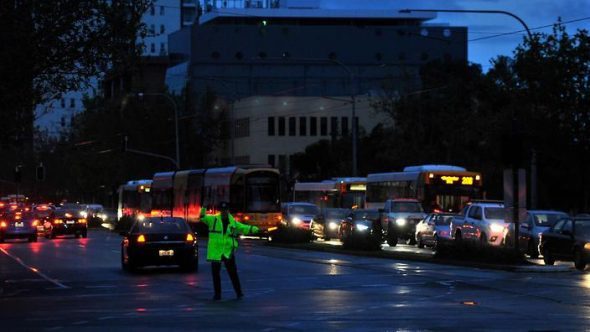
Yesterday a once-in-50-year storm took out the entire South Australian power system. More than 20 huge electricity pylons were toppled by furious winds in storm supercells at multiple locations across the state, triggering what the electricity system operator calls a “System Black”.
The rest of us know it as a blackout. The state was cut off from the rest of the national electricity grid and the power went down. A huge team of experts scrambled to make sure residents were safe and secure, and to re-start the power system.
Many South Australians handled the situation pretty well, lighting candles and finding some ways to be light-hearted despite all the chaos caused by the storms.
Given the remarkable weather conditions, what happened in South Australia could have happened anywhere. But what was extraordinary was how fast politicians and others tried to use this as an opportunity to pin the situation on renewable energy, before anyone even knew what had happened.
It is even more extraordinary when we have just been through a Federal Election where Australians voted away from the major parties in droves. This is partly because they are sick of politicians playing games among themselves rather than working together to get things done for the people they are supposed to represent.
I’m not sure they got the hint, because even the minor parties were playing political games yesterday, instead of working out how they might be able to help the situation.
Senator Nick Xenophon was one of the earliest to go out, saying long before any facts were on the table: “We have relied too much on wind rather than baseload renewables, rather than baseload power, including gas which is a fossil fuel but it is 50 per cent cleaner than coal and a good transitional fuel.”
Never mind that this had absolutely nothing to do with the situation at hand and that he had no information about what had happened. The power went out, and in his mind it must have somehow been caused by wind energy, which he opposes. But he wasn’t the only one to leap to conclusions.
Deputy Prime Minister Barnaby Joyce said the blackout should raise issues about renewable energy and the lack of coal-fired power. And SA Opposition Leader Steven Marshall attacked the state government, saying it had serious questions to answer.
We also had Chris Uhlmann, a senior and credible ABC journalist, blaming renewable energy – again before anyone knew anything. And even after ElectraNet, federal Energy Minister Josh Frydenberg, SA Premier Jay Weatherill, the grid operator and Tony Wood from the Grattan Institute all confirmed that the outage was due to extreme weather, Mr Uhlmann doubled down, trying hard to find a way to make renewables the centre of the story.
We can’t expect everyone to be on board with the move to cleaner sources of energy which is happening across the world, and there are inevitable challenges that need to be addressed.
But in the middle of a crisis caused by severe storms which took out a lot of massive electricity towers, our politicians should be trying to work together to help get everything back on track rather than blaming each other. We can and should be doing a lot better than this.
Electricity is complicated. Let’s not make up our own facts about it just because it suits our political agenda. If you do, you shouldn’t be surprised when people continue to switch off their support for politicians.
Tom Butler is Clean Energy Council Policy Manager.








